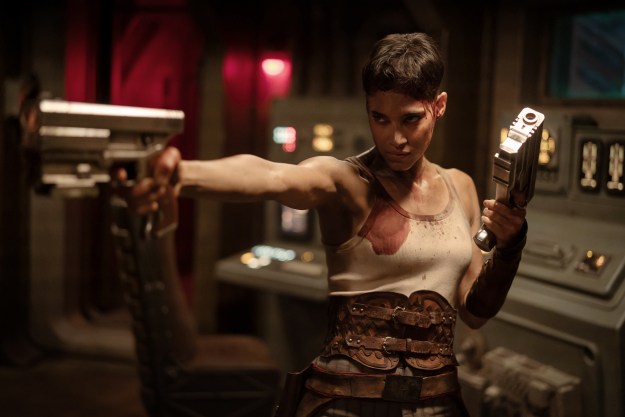
In January, we saw the debut of consumer-ready 4K televisions at the Consumer Electronics Show and in December, a major studio released a major motion picture simultaneously in theaters and online for the first time ever (albeit under very special circumstances). In between, we saw HBO announce a plan to offer its programming to non-cable subscribers, the final nail in the coffin for plasma TVs, and a controversial new light saber courtesy of J.J. Abrams and Co.
Also this year: Time Warner and Comcast got drunk and decided to get hitched (despite protests from everyone in the known world), Yahoo saved Community, and Mythbusters sloughed off three-fifths of its talent. Oh, and a little thing called “net neutrality” became a hot-button political issue.
Some of the developments likely to have the biggest impact in the long-term, though, didn’t get nearly as much attention. Here are three things that happened this year you may have missed, and why they matter:
Vessel
Vessel is a new video streaming start-up from a couple former Hulu employees. With YouTube, Vimeo (i.e. Hipster Youtube), Netflix, Amazon Prime Instant Video, and, well, Hulu still around, do we really need another streaming platform? Probably not, but what’s notable about Vessel is their focus on short-form videos – i.e. YouTube bread and butter – and their “freemium” business model.
In some ways, Vessel has more in common with Candy Crush than it does YouTube. All content on Vessel will be free for the widest possible consumption, but for a modest subscription, super-users will get early access to videos. Those subscriptions combined with general ad revenue will support deals with content creators that are way more generous than what YouTube currently offers them. This “creator-friendly model,” I predict, will be Vessel’s true legacy.

Right now, whether Google will admit it or not, YouTube has a content-creator problem. At Comic-Con this summer, Chris Hardwick let slip that Nerdist Industries was pulling back its dependency on YouTube for video distribution, opting to focus on getting more users to visit their own site. A press release from Nerdist later “clarified” Hardwick’s remarks, saying the company still views YouTube as a “tremendous partner,” but any long-time fan of the Hardwick’s podcast knows how he feels about the tenor, flippancy, and attention-span of the typical YouTube visitor (among other troll-attracting sites).
Vessel seems designed from the ground up to address those concerns – offering content creators a greater share of revenue and a more mature, more engaged audience. Even if Vessel is too late to the game to succeed, its creator-centric business model should find a home somewhere. It might even be the key to producing high-quality content in a post-cable world.
Garcia v. Google
There’s a legal battle raging over a controversial American movie that’s angered people overseas … and that film is not The Interview. Remember in 2012, when a poorly-made 14-minute YouTube video titled Innocence of Muslims incited violent protests throughout the Middle East due its incendiary content? An actress in the video, Cindy Lee Garcia, citing threats of violence against her and others associated with the movie, tried to get Google to pull it from YouTube. When Google didn’t comply, she turned to the courts.
Google is now in the odd position of fighting on behalf of traditional copyright holders.
The threats were definitely real. The fact that the video’s producers misrepresented the intent of the video to cast and crew was also real. By all accounts, it looks like Ms. Garcia’s performance really was used in ways she never intended. The problem? None of that is Google’s problem.
By law, Google is only compelled to pull the video on one condition – if the video in question infringes on someone else’s copyright. So Ms. Garcia and her lawyers sued on copyright grounds, claiming that since she’d been fraudulently duped into appearing in the wrong movie, the producers of the film lost the legal right to exploit her image and likeness. She’s essentially claiming she still owns the copyright on her performance, and, as such, she has the legal right to request Google remove the video on copyright violation claims. Garcia lost in a trial court, and the video stayed up. And then an appellate court rule on the matter, overturning the lower court’s decision and ordered the video to be removed.

Google is now getting the case reheard at the appellate level, citing (among other things) a dangerous precedent if copyright could be so easily voided based on a performer’s claim of misuse. In other words, Google – which has fought vociferously in the past to avoid policing copyright violations via their services – is now in the odd position of fighting on behalf of traditional copyright holders.
Oral arguments were made in December and a new ruling should come in 2015. My guess is that the court make their ruling as narrow as possible, so it won’t disrupt the status quo too much either way (either for against copyright), but it’ll be very interesting to see what happens nonetheless.
If either side doesn’t see things go their way, the next step is the U.S. Supreme Court.
Universal’s Big Year
Comcast CFO Michael Angelakis recently announced that 2014 was Universal Picture’s most profitable year ever. (Comcast acquired a majority stake in NBCUniversal in 2009.) What’s remarkable about that fact is that Universal’s 2014 slate was extremely modest compared not just to its studio peers, but also to its own slates in recent years.
It might even be the key to producing high-quality content in a post-cable world.
Three caveats. One: I’m guessing its profits this year include money still being generated by major releases from years past – like 2013’s Despicable Me 2 and 2012 Fast 6. Two: I don’t think that “best year ever” tag took inflation into account. Three: A subdued slate definitely wasn’t Universal’s plan from the onset, as Fast 7 was originally scheduled for release this past summer, before tragedy caused its delay.
Those caveats aside, it’s still an impressive thing to brag about in the age of the mega-movie (something I wrote about a few weeks ago). Next year Universal will be back in the blockbuster game in a big way with Jurassic World, Minions, and the aforementioned Fast 7, but anything that can lead Hollywood to re-embrace the medium budgeted crowd-pleaser is something to celebrate.
From a technological standpoint, it might mean less 3D and CG, but I’m not sure many people will be complaining about that.


